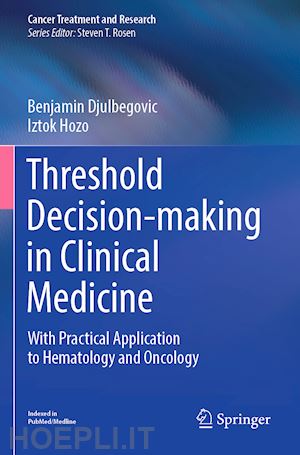

Questo prodotto usufruisce delle SPEDIZIONI GRATIS
selezionando l'opzione Corriere Veloce in fase di ordine.
Pagabile anche con Carta della cultura giovani e del merito, 18App Bonus Cultura e Carta del Docente
This book aims to provide threshold models to help physicians to make optimal diagnostic, therapeutic and predictive decisions. Readers will not only find theoretical information but also practical examples illustrating how these decisions should be made.
Poor decision-making is considered a leading cause of death in contemporary medicine. Decisions, however, have to be made - at a given threshold of risk and unfortunately physicians are not trained on how to make decisions. This book provides help to all those who want to improve their decision-making for a better patient outcome. With its examples from hematology and oncology the book will not only benefit haematologists and oncologists but physicians from all disciplines, hence the threshold model is applicable to all fields in medicine. This book will be useful to experienced physicians as well as trainees alike.
Iztok Hozo is a Professor at Indiana University Northwest. After completing his doctoral thesis in applied mathematics at University of Michigan, his main research interests became applications of mathematical modelling and decision theory in Medical applications. Mainly collaborating with Dr. Djulbegovic, he published 75 articles in peer-reviewed scientific journals.
In addition to receiving several Indiana University awards for excellence in research, Dr. Hozo won prestigious teaching awards in recognition of his expertise in the classroom and curriculum development.
He is a mathematician capable of translating real scientific and medical problems into mathematical language. His mathematical acumen has enabled him to tackle the vast array of diverse medical problems. Over the years he has made contribution to statistical analysis of clinical data and improvement in techniques of meta-analysis, tackled the issues of diagnostic tests using information theory approach, recast the issue of clinical trials from game theory point of view, developed new methods for decision-making, including a novel method based on mathematical modelling of regret, and helped develop the first mathematical model of decision-making that is based on dual processing theory and developed a new theory called acceptable regret, which could explain many phenomena in the diagnostic and treatment decisions in medicine.
According to Google Scholar, his current h-index is 25. One of his published articles has over 4200 citations (written jointly with Dr. Djulbegovic and Mrs. Pudar-Hozo).











Il sito utilizza cookie ed altri strumenti di tracciamento che raccolgono informazioni dal dispositivo dell’utente. Oltre ai cookie tecnici ed analitici aggregati, strettamente necessari per il funzionamento di questo sito web, previo consenso dell’utente possono essere installati cookie di profilazione e marketing e cookie dei social media. Cliccando su “Accetto tutti i cookie” saranno attivate tutte le categorie di cookie. Per accettare solo deterninate categorie di cookie, cliccare invece su “Impostazioni cookie”. Chiudendo il banner o continuando a navigare saranno installati solo cookie tecnici. Per maggiori dettagli, consultare la Cookie Policy.